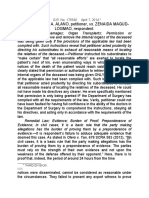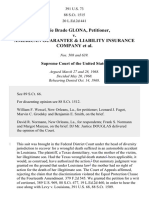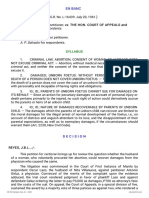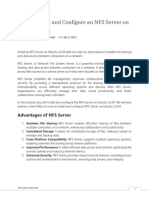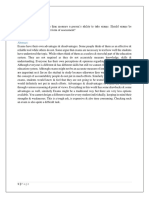0 ratings0% found this document useful (0 votes)
325 viewsCes V Superclinic
Ces V Superclinic
Uploaded by
joanneThis document summarizes the key points from the case CES v Superclinics (Aust) Pty Ltd [1995]. It discusses the majority and dissenting opinions:
- The majority found the plaintiff's claim was repelled by statutory illegality since abortion was illegal, and allowing damages would sanction an illegal act.
- Kirby J dissented, arguing it was unrealistic to not consider the reality of abortion availability. Denying damages effectively shifted the burden of the defendant's negligence to the patient.
- Kirby J also argued it was inappropriate to declare an unwanted child born due to negligence must always be considered a blessing. The parents considered the child would be a greater burden, as shown by their desire to terminate
Copyright:
© All Rights Reserved
Available Formats
Download as DOCX, PDF, TXT or read online from Scribd
Ces V Superclinic
Ces V Superclinic
Uploaded by
joanne0 ratings0% found this document useful (0 votes)
325 views3 pagesThis document summarizes the key points from the case CES v Superclinics (Aust) Pty Ltd [1995]. It discusses the majority and dissenting opinions:
- The majority found the plaintiff's claim was repelled by statutory illegality since abortion was illegal, and allowing damages would sanction an illegal act.
- Kirby J dissented, arguing it was unrealistic to not consider the reality of abortion availability. Denying damages effectively shifted the burden of the defendant's negligence to the patient.
- Kirby J also argued it was inappropriate to declare an unwanted child born due to negligence must always be considered a blessing. The parents considered the child would be a greater burden, as shown by their desire to terminate
Original Title
CES V SUPERCLINIC.docx
Copyright
© © All Rights Reserved
Available Formats
DOCX, PDF, TXT or read online from Scribd
Share this document
Did you find this document useful?
Is this content inappropriate?
This document summarizes the key points from the case CES v Superclinics (Aust) Pty Ltd [1995]. It discusses the majority and dissenting opinions:
- The majority found the plaintiff's claim was repelled by statutory illegality since abortion was illegal, and allowing damages would sanction an illegal act.
- Kirby J dissented, arguing it was unrealistic to not consider the reality of abortion availability. Denying damages effectively shifted the burden of the defendant's negligence to the patient.
- Kirby J also argued it was inappropriate to declare an unwanted child born due to negligence must always be considered a blessing. The parents considered the child would be a greater burden, as shown by their desire to terminate
Copyright:
© All Rights Reserved
Available Formats
Download as DOCX, PDF, TXT or read online from Scribd
Download as docx, pdf, or txt
0 ratings0% found this document useful (0 votes)
325 views3 pagesCes V Superclinic
Ces V Superclinic
Uploaded by
joanneThis document summarizes the key points from the case CES v Superclinics (Aust) Pty Ltd [1995]. It discusses the majority and dissenting opinions:
- The majority found the plaintiff's claim was repelled by statutory illegality since abortion was illegal, and allowing damages would sanction an illegal act.
- Kirby J dissented, arguing it was unrealistic to not consider the reality of abortion availability. Denying damages effectively shifted the burden of the defendant's negligence to the patient.
- Kirby J also argued it was inappropriate to declare an unwanted child born due to negligence must always be considered a blessing. The parents considered the child would be a greater burden, as shown by their desire to terminate
Copyright:
© All Rights Reserved
Available Formats
Download as DOCX, PDF, TXT or read online from Scribd
Download as docx, pdf, or txt
You are on page 1of 3
Page 35 case note considred by known journalists
Known status of case = distinguished, applied or followed
If ihas been ^ just say that it has been
Unit outline 5-7
18-25 case note unit reader
when writing the case note = assume it goes on legal firms website
plain English
identify the ratio decendi
the ratio for this case is
- 29-32 example of a case note = sort of thing he looks for
- Case notes on school of law
- Clients are going to be reading this
- Footnotes of the case itself
- Where in the case are we relying on the info
- Do not summarise the case based on another summary
- If the case considers legislation then look if it is still applicable
- Why do I care about this case? I care because it reflects the
current law
- What we think about the case?
- Most referencing is the case itself
- If we form the view of reading the case, that it raises issues
for commonwealth, the high courts use of the judicial notion of
marriage happens to lead to potential provisions etc..
reference the article from the unit reader previously to support
this.
CES v Superclinics (Aust) Pty Ltd [1995]
Failure to diagnose a pregnancy led to a claim for damages for
loss of chance to have an abortion the cost of bringing up
the child
Kirby P extended Levines test to include consideration of the
impact of going to term on the womans health after the birth
of the child.
I am of the view (which Priestly JA said at first attracted him)
that the plaintiff's claim is repelled by statutory illegality. As
Newman J said:
the common law does not categorise the loss of an
opportunity to procure an illegal act as a matter for which
damages may be recovered.
The position is perfectly clear: s 82 and s 83 of the
Crimes Act 1900 make abortion illegal. There is an apparent
and unstated exception in cases where an abortion is
necessary to preserve the mother's health: R v Wald [1971] 3
NSWDCR 25.This apparent exception has no application on the
present facts. per Meagher J
Newman J found the plaintiff's health excellent at all times.
Nor could a medical practitioner, however progressive, have
had honest or reasonable grounds to think otherwise so
much is expressly found by his Honour. Moreover, in these
circumstances the plaintiff could hardly have had honest or
reasonable grounds for believing an abortion to
be legal. But, I am also of the view that the plaintiff's action
contravenes the general public policy of the law as well as the
provisions of specific sections of the Crimes Act 1900. It is
important to focus attention on precisely what the plaintiff was
trying to do.
The case is not about the morality of abortion; nor is it really
about whether the plaintiff would or would not be legally
entitled to have an abortion. It is about the question whether
a woman may in our courts sue a defendant because he
allegedly deprived her of the opportunity
of having an operation, with the result that she involuntarily
gave birth to a child. Having given birth to a healthy child in
August 1987, the plaintiff claimed at a court hearing in
December 1993 that the child, then over six years old, was
unwelcome, a misfortune, perhaps a disaster, certainly a head
of damages. per Meagher J
For all I know the child was in court to witness her mother's
rejection of her. Perhaps, on the other hand, the plaintiff had
the taste to keep her child out of court. Even if
that be so, it does not mean the unfortunate infant will never
know that her mother has publicly declared her to be
unwanted. When she is at school some ame charitable
perhaps the mother of one of her friends can be trusted
to direct her attention to the point. That a court of law should
sanction such an action seems to me improper to
the point of obscenity. It seems to me that our law has always
proceeded on the premise that human life is sacred. That is so
despite an occasional acknowledgment that existence is a
vale of tears. per Meagher J
Hence, in criminal law, except within closely defined limits, to
take another's life is murder; to threaten to do so is a criminal
offence. To abort a child in utero is a common law
misdemeanour.
per Meagher J
I would underline the need to consider the likelihood of such
a termination being found to be unlawful. This reflects the
reality of the availability of termination procedures in our
society today. Taking that reality into account would permit
commonsense to intrude into the
Court's deliberations. It would allow the Court to take into
account the fact that it would be most unlikely that any
medical practitioner, still less the first appellant, would have
been prosecuted and taken to trial. per Kirby J
There is an air of unreality in the contrary approach favoured
by Newman J and favoured by the majority in this Court. I
realise that termination of pregnancy is a subject which is
prone to engender very strong feelings. It has a tendency, in
some cases, to divide the attitudes of women (who must, in
practice, bear most of the
consequences) and of men (who number most of the judges
enforcing the law). But a point is reached in this case where I
feel bound to remind the Court of the reality of the application
of s 83 of the Crimes Act in this State following Wald. per
Kirby J
It may or may not be a desirable reality. Upon that question,
theologians, philosophers and citizens will differ, but to
interpret that law without reference to such
reality in a claim for civil damages where serious breaches of
duty have been accepted to have occurred is, in my view,
quite unrealistic. Effectively, it shifts the burden of the
respondents' proved breaches of duty of care in this case from
them to a patient who came to their Superclinic and
received careless treatment. It sanctions without civil redress
serious acts and defaults which have resulted in very
substantial losses to the appellants. This cannot be, and is
not, the law. per Kirby J
It is quite inappropriate for a court to declare that a child,
initially unwanted, and whose birth was caused by the
negligence of a medical practitioner, should always be
regarded for all purposes as a blessing, whatever the
facts of the particular case. Similarly it is unconvincing (at
least to me) that to deny recovery for the undoubted
economic loss that accrues would demean the sanctity of
human life, whatever the circumstances of the case.
The inadequacy of such reasoning is highlighted by the fact
that the parents themselves have already, in a case such as
the present, assessed the situation. per Kirby J
They concluded that the child would, in fact, be a greater
burden that a desired blessing. This conclusion was
manifested by the steps taken, or the desires expressed, to
secure a termination of the pregnancy at a time when this
could have been safely done. The widespread use of
contraceptive measures is itself an indication of a
general social disagreement with the theory that every
potential child must necessarily be considered an unalloyed
blessing. per Kirby J
You might also like
- Medici Godfathers of The RenaissanceDocument17 pagesMedici Godfathers of The RenaissanceopoplNo ratings yet
- Exam 1 Study Guide LEB 323Document15 pagesExam 1 Study Guide LEB 323Daniel MorganNo ratings yet
- Handbook of Mitigation In Criminal and Immigration Forensics: 5th EditionFrom EverandHandbook of Mitigation In Criminal and Immigration Forensics: 5th EditionNo ratings yet
- Macasaet Vs Macasaet DigestDocument1 pageMacasaet Vs Macasaet DigestRyan Suaverdez50% (2)
- Decent Work Employment and Transcultural Nursing NCM 120: Ma. Esperanza E. Reavon, RN, ManDocument41 pagesDecent Work Employment and Transcultural Nursing NCM 120: Ma. Esperanza E. Reavon, RN, ManMa. Esperanza C. Eijansantos-Reavon100% (2)
- Why Is Franchising A Popular Way To Expand Distribution of An Effective Service ConceptDocument2 pagesWhy Is Franchising A Popular Way To Expand Distribution of An Effective Service ConceptVikram KumarNo ratings yet
- Geluz Vs CA, G.R. No. L-16439, July 20, 1961 (2 SCRA 801)Document3 pagesGeluz Vs CA, G.R. No. L-16439, July 20, 1961 (2 SCRA 801)Lester AgoncilloNo ratings yet
- Dr. Emmanuel Jarcia, Jr. and Dr. Marilou Bastan, Petitioners, vs. People of THE PHILIPPINES, RespondentDocument18 pagesDr. Emmanuel Jarcia, Jr. and Dr. Marilou Bastan, Petitioners, vs. People of THE PHILIPPINES, Respondentmartina lopezNo ratings yet
- Ratio DecidendiDocument3 pagesRatio Decidendihithan414No ratings yet
- Criminal Liability in Negligence CasesDocument5 pagesCriminal Liability in Negligence CasesturabbdemailNo ratings yet
- What The Baby M Case Is Really All About: Law & Inequality: A Journal of Theory and PracticeDocument9 pagesWhat The Baby M Case Is Really All About: Law & Inequality: A Journal of Theory and PracticeKkNo ratings yet
- He Constitutional Court inDocument4 pagesHe Constitutional Court inPinky Bee MajoziNo ratings yet
- United States Court of Appeals, Fourth CircuitDocument3 pagesUnited States Court of Appeals, Fourth CircuitScribd Government DocsNo ratings yet
- My Actus Reus AnswersDocument8 pagesMy Actus Reus Answerssuparnahassan974No ratings yet
- Torts Week1Document10 pagesTorts Week1PoojakisholiNo ratings yet
- Geluz Vs Court of AppealsDocument3 pagesGeluz Vs Court of AppealsCYRUZE EGAN ANGOGNo ratings yet
- Feminist Jurisprudence - Why Law Must Consider Womens PerspectiveDocument4 pagesFeminist Jurisprudence - Why Law Must Consider Womens PerspectivesmartjerkNo ratings yet
- Malicious ProsecutionDocument7 pagesMalicious ProsecutionNimra Advocate100% (1)
- 8 Fascinating Cases and Legal Ideas For The Law EnthusiastDocument7 pages8 Fascinating Cases and Legal Ideas For The Law EnthusiastMary RoseNo ratings yet
- Buck V BellDocument2 pagesBuck V BellJune Steve Barredo100% (1)
- 5 Important Legal Maxims in Law of TortsDocument7 pages5 Important Legal Maxims in Law of TortsWhite elephantNo ratings yet
- Mauricio - FallaciesDocument4 pagesMauricio - FallaciesOmar Kareem MauricioNo ratings yet
- Call For Legalization of Surrogacy6188 PDFDocument18 pagesCall For Legalization of Surrogacy6188 PDFsamiaNo ratings yet
- Memorandum People V Franze RamirezDocument19 pagesMemorandum People V Franze RamirezTsi Ming TsoiNo ratings yet
- International Surrogacy PDFDocument18 pagesInternational Surrogacy PDFvijay srinivasNo ratings yet
- SummaryDocument5 pagesSummarybonganiiNo ratings yet
- 60 Dick LRev 270 Octoberto JunDocument7 pages60 Dick LRev 270 Octoberto JunGiorgi BidzishviliNo ratings yet
- United States v. Duane Watts, 513 F.2d 5, 10th Cir. (1975)Document10 pagesUnited States v. Duane Watts, 513 F.2d 5, 10th Cir. (1975)Scribd Government DocsNo ratings yet
- Garcia-Rueda vs. Pascasio G.R. No. 118141. September 5, 1997 FULL TEXTDocument5 pagesGarcia-Rueda vs. Pascasio G.R. No. 118141. September 5, 1997 FULL TEXTJeng PionNo ratings yet
- Lucille H. Burch v. Reading Company, 240 F.2d 574, 3rd Cir. (1957)Document13 pagesLucille H. Burch v. Reading Company, 240 F.2d 574, 3rd Cir. (1957)Scribd Government DocsNo ratings yet
- An Action For Wrongful Life. PloscoweDocument4 pagesAn Action For Wrongful Life. PloscowecesaredmorenoNo ratings yet
- Law of Damages Assignment One Student Number: 63666596 Unique Number: 758498 Due Date: 15 May 2021Document10 pagesLaw of Damages Assignment One Student Number: 63666596 Unique Number: 758498 Due Date: 15 May 2021Zororai NkomoNo ratings yet
- United States Court of Appeals, Fourth CircuitDocument22 pagesUnited States Court of Appeals, Fourth CircuitScribd Government DocsNo ratings yet
- Essay Delict and Medical NegligenceDocument2 pagesEssay Delict and Medical NegligenceCorman Olivier100% (1)
- Civil Persona Full KrisDocument16 pagesCivil Persona Full KrisKris Antonnete DaleonNo ratings yet
- Fallacies of Insufficient EvidenceDocument9 pagesFallacies of Insufficient EvidenceJohnson Yaplin100% (1)
- 2009 ZA Q3 Rules BiasDocument4 pages2009 ZA Q3 Rules BiasNivneth PeirisNo ratings yet
- Geluz v. CA (G.R. No. L-16439 July 20, 1961)Document4 pagesGeluz v. CA (G.R. No. L-16439 July 20, 1961)Hershey Delos SantosNo ratings yet
- Tort LawDocument4 pagesTort LawMinahal FaisalNo ratings yet
- Law Review: University of PennsylvaniaDocument25 pagesLaw Review: University of PennsylvaniaRodolfo BecerraNo ratings yet
- I Need You To LoseDocument22 pagesI Need You To LoseBrandon FerrickNo ratings yet
- 13 - Alano Vs Magud-LogmaoDocument24 pages13 - Alano Vs Magud-Logmaomartina lopezNo ratings yet
- PINCHIN AND ANOTHER, NO V SANTAM INSURANCE CO LTD (1963) 2 All SA 267 (W)Document6 pagesPINCHIN AND ANOTHER, NO V SANTAM INSURANCE CO LTD (1963) 2 All SA 267 (W)Nomfundo MabasoNo ratings yet
- Villaflor Vs SummersDocument2 pagesVillaflor Vs SummersinvictusincNo ratings yet
- Estrada V Desierto BriefDocument1 pageEstrada V Desierto BriefChow Momville EstimoNo ratings yet
- How To Write Analytically in A Legal Setting - Lecture NotesDocument12 pagesHow To Write Analytically in A Legal Setting - Lecture NotesGuri ShkodraNo ratings yet
- Sperm BanditsDocument19 pagesSperm BanditsLeonardo RedaelliNo ratings yet
- Negligence-TORTS NOTESDocument50 pagesNegligence-TORTS NOTESMusa MomohNo ratings yet
- Negligence Only OutlineDocument7 pagesNegligence Only OutlineSana GuptaNo ratings yet
- A Mixed Question of Law and FactDocument13 pagesA Mixed Question of Law and FactVikram DasNo ratings yet
- 2006HCA15Document86 pages2006HCA15Trung PhamNo ratings yet
- Cruz V CaDocument16 pagesCruz V CaAleah LS KimNo ratings yet
- Burden of Proof - Degrees of BeliefDocument28 pagesBurden of Proof - Degrees of BeliefF.E. Guerra-PujolNo ratings yet
- 22 Geluz VS CaDocument1 page22 Geluz VS CaRura RecaNo ratings yet
- DR. FILOTEO A. ALANO, Petitioner, vs. ZENAIDA MAGUD-LOGMAO, RespondentDocument42 pagesDR. FILOTEO A. ALANO, Petitioner, vs. ZENAIDA MAGUD-LOGMAO, RespondentRhea Ibañez - IlalimNo ratings yet
- United States Court of Appeals, Third CircuitDocument13 pagesUnited States Court of Appeals, Third CircuitScribd Government DocsNo ratings yet
- Glona v. American Guarantee & Liability Ins. Co., 391 U.S. 73 (1968)Document8 pagesGlona v. American Guarantee & Liability Ins. Co., 391 U.S. 73 (1968)Scribd Government DocsNo ratings yet
- Contribution Between Joint Tort FeasorsDocument8 pagesContribution Between Joint Tort FeasorsKulsum KhanNo ratings yet
- Mother'sLiab US and ENGLANDDocument9 pagesMother'sLiab US and ENGLANDshivamjain391No ratings yet
- 2 Tort Negeligence-1Document26 pages2 Tort Negeligence-1Allan SsemujjuNo ratings yet
- In The Matter of Baby JusticeDocument7 pagesIn The Matter of Baby JusticeJonathan Dantas PessoaNo ratings yet
- Geluz v. CA PDFDocument3 pagesGeluz v. CA PDFrattyaNo ratings yet
- Art of Being Human 11th Edition Janaro Test BankDocument35 pagesArt of Being Human 11th Edition Janaro Test BankribaduufukNo ratings yet
- People Vs RamoleteDocument11 pagesPeople Vs RamoleteNaif OmarNo ratings yet
- ADF Architects Datafile (2012-12) PDFDocument68 pagesADF Architects Datafile (2012-12) PDFCésar VasconcellosNo ratings yet
- SBU Strategies, Portfolio Analysis BCG & GEDocument61 pagesSBU Strategies, Portfolio Analysis BCG & GEAfreen ShaikhNo ratings yet
- Deed of AgreementDocument11 pagesDeed of AgreementSulemanKhNo ratings yet
- Tutorial Configure NfsDocument5 pagesTutorial Configure NfsSYED AHMAD SHAUQI BIN SYED SHUHAIMINo ratings yet
- Compensatory Time-Off (Cto)Document2 pagesCompensatory Time-Off (Cto)DAVE NICK BESANANo ratings yet
- Herbert Fisher: NapoleonDocument264 pagesHerbert Fisher: NapoleonMetchdr100% (1)
- A Review of Scholarship On The Buddhist Councils - PrebishDocument16 pagesA Review of Scholarship On The Buddhist Councils - Prebish101176No ratings yet
- Techcult Engineering - PresentationDocument20 pagesTechcult Engineering - PresentationKAMLESH KUMAR SinghNo ratings yet
- Monthly Dividends Payers SpreadsheetDocument4 pagesMonthly Dividends Payers SpreadsheetJohn TownsendNo ratings yet
- Cfas Exam3 ProblemsDocument8 pagesCfas Exam3 ProblemspolxrixNo ratings yet
- Gainer 1993Document15 pagesGainer 1993Kaoutar KANo ratings yet
- Complete The Sentences With The Correct Form of Be Going ToDocument2 pagesComplete The Sentences With The Correct Form of Be Going Torafael rodriguez romoNo ratings yet
- Self AwarenessDocument5 pagesSelf AwarenessallenalinjeteNo ratings yet
- Under Him ScriptDocument4 pagesUnder Him Scriptwhite1rcNo ratings yet
- Avaya Call Managment System SupervisorDocument580 pagesAvaya Call Managment System SupervisorchpppppNo ratings yet
- English 4Document8 pagesEnglish 4Ali SheraziNo ratings yet
- Grade 7 Recollection: Ateneo de ManilaDocument24 pagesGrade 7 Recollection: Ateneo de ManilaAntonio Martin BasilioNo ratings yet
- Team 4 - Ansoff MatrixDocument6 pagesTeam 4 - Ansoff MatrixAvanish VishwakarmaNo ratings yet
- Lit001 - Philippine Literature: STUDY NOTES ON "THE Magnificence" by Estrella Alfon Character AnalysisDocument1 pageLit001 - Philippine Literature: STUDY NOTES ON "THE Magnificence" by Estrella Alfon Character AnalysisRodeza Umeran MaqueraNo ratings yet
- Profeta Vs DrilonDocument3 pagesProfeta Vs DrilonjokuanNo ratings yet
- An Introduction To The School of AlexandriaDocument5 pagesAn Introduction To The School of AlexandriaBilly J. Zorina100% (1)
- Jurisprudence (PERJURY)Document4 pagesJurisprudence (PERJURY)Harold MapeNo ratings yet
- Madhav Institute of Technology & Science, Gwalior-05: PH.: 0751-2409397, Fax: 0751-2664684Document4 pagesMadhav Institute of Technology & Science, Gwalior-05: PH.: 0751-2409397, Fax: 0751-2664684Akansh JainNo ratings yet
- Gitarattan International Business School Student Notice: Unit Test Date Sheet BBA (I & II Shift) (Semester 4 & 6)Document1 pageGitarattan International Business School Student Notice: Unit Test Date Sheet BBA (I & II Shift) (Semester 4 & 6)anshNo ratings yet
- Supply Chain Management Powerpoint PresentationDocument25 pagesSupply Chain Management Powerpoint PresentationJericko MalayaNo ratings yet























































